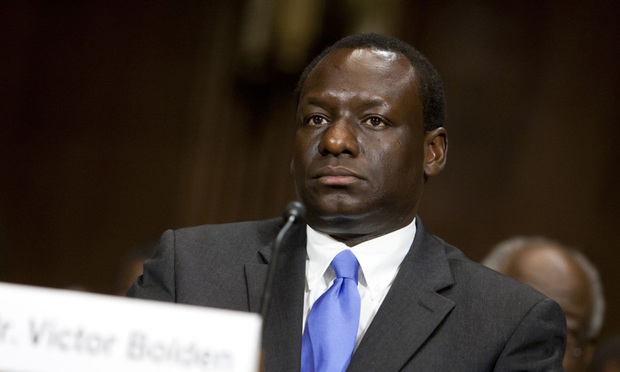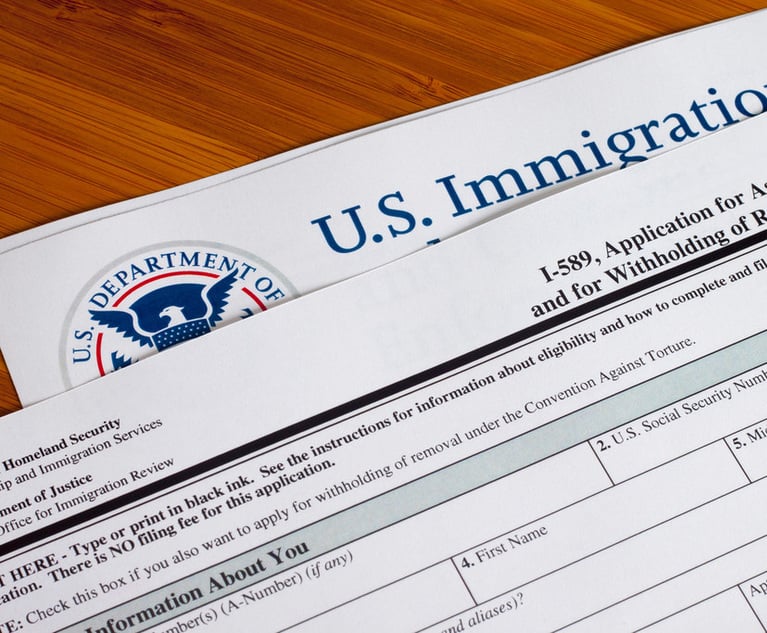Bad News for Connecticut Judicial Branch: Court Green-Lights Racial Discrimination Lawsuit Against It
A federal judge in Connecticut threw out some claims, but let a racial discrimination lawsuit filed against the state's Judicial Branch proceed.
June 16, 2020 at 05:39 PM
4 minute read
 Connecticut U.S. District Judge Victor Bolden. Photo: Diego M. Radzinschi/ALM
Connecticut U.S. District Judge Victor Bolden. Photo: Diego M. Radzinschi/ALM
A Connecticut federal judge has said a lawsuit filed on behalf of a black woman who sued the Connecticut Judicial Branch claiming racial discrimination and a hostile work environment can continue.
In his ruling, U.S. District Judge Victor Bolden said the Title VII claim of Secrett Hampton against the branch can continue. Bolden also let stand three state law claims, including intentional infliction of emotional distress. The judge, however, threw out claims of disparate treatment against three of Hampton's supervisors.
The plaintiff worked as a juvenile detention transportation officer since 2008. She brought a claim under Title VII of the Civil Rights Act of 1964, as amended in the Civil Rights Act of 1991, which prohibits racial discrimination.
"The judge made the right call with regard to Title VII. There was no other rationale decision," said William Palmieri, the New Haven solo practitioner who has represented Hampton and five other black or Hispanic current or former Judicial Branch employees.
The cases are separate, but all allege racial discrimination within the branch, Palmieri said. In one case, Palmieri said, he won a $550,000 jury verdict in 2018 against the branch over racial discrimination claims from one Hispanic employee.
Palmieri said Hampton, a New Haven resident in her 40s, is still employed at the Judicial Branch.
The crux of the amended August 2019 lawsuit alleges Hampton's supervisors acted with malice toward her following an incident with a juvenile inmate because of the color of her skin.
It alleges Hampton and another employee were transporting a violent inmate to a medical appointment. That inmate, who had past behavioral issues, according to the lawsuit, escaped while under the supervision of the plaintiff. He was later apprehended.
Soon after, the lawsuit alleges, Hampton was told "to hand in her badge," and was placed on unpaid administrative leave. Hampton was fired soon after. But because she won a union arbitration, she was later reinstated.
The lawsuit states that a white employee who had a similar incident with another inmate was not disciplined. Instead, that white employee was later promoted, the lawsuit says,
The lawsuit says the treatment of Hampton and the white employee shows the judicial branch "discriminated against her in the terms and conditions of employment based on her race, color and ethnicity."
Palmieri was seeking compensatory and punitive damages. Bolden said Hampton would not be entitled to punitive damages, but said, "Her claims for compensatory damages, which ordinarily would be resolved by a jury, can be resolved by a jury."
Palmieri said he hasn't put a dollar figure on how much in compensatory damages he'd seek.
"Let's let the jury look at this, and with guidance and understanding of the law, say what they think the harm is," he said.
The attorney is no stranger to opposing the government.
Palmieri, whose practice specializes in civil rights law, pleaded guilty in December to two counts of willful failure to pay income taxes. He was released on bond pending sentencing later this year. He faces a maximum of two years in prison, a fine and restitution to the IRS.
On Tuesday, Rhonda Stearley Hebert, a spokeswoman for the Judicial Branch, declined to comment on the judge's ruling.
Representing the Judicial Branch was Carletha Texidor, an attorney with the Office of the Attorney General. Elizabeth Benton, a spokeswoman for the office, declined to comment.
Read more:
This content has been archived. It is available through our partners, LexisNexis® and Bloomberg Law.
To view this content, please continue to their sites.
Not a Lexis Subscriber?
Subscribe Now
Not a Bloomberg Law Subscriber?
Subscribe Now
NOT FOR REPRINT
© 2025 ALM Global, LLC, All Rights Reserved. Request academic re-use from www.copyright.com. All other uses, submit a request to [email protected]. For more information visit Asset & Logo Licensing.
You Might Like
View All

Trump Administration Faces Legal Challenge Over EO Impacting Federal Workers
3 minute read
Settlement Allows Spouses of U.S. Citizens to Reopen Removal Proceedings
4 minute read
Trending Stories
- 1Loopholes, DNA Collection and Tech: Does Your Consent as a User of a Genealogy Website Override Another Person’s Fourth Amendment Right?
- 2Free Microsoft Browser Extension Is Costing Content Creators, Class Action Claims
- 3Reshaping IP Policy Under the Second Trump Administration
- 4Lawyers' Reenactment Footage Leads to $1.5M Settlement
- 5People in the News—Feb. 4, 2025—McGuireWoods, Barley Snyder
Who Got The Work
J. Brugh Lower of Gibbons has entered an appearance for industrial equipment supplier Devco Corporation in a pending trademark infringement lawsuit. The suit, accusing the defendant of selling knock-off Graco products, was filed Dec. 18 in New Jersey District Court by Rivkin Radler on behalf of Graco Inc. and Graco Minnesota. The case, assigned to U.S. District Judge Zahid N. Quraishi, is 3:24-cv-11294, Graco Inc. et al v. Devco Corporation.
Who Got The Work
Rebecca Maller-Stein and Kent A. Yalowitz of Arnold & Porter Kaye Scholer have entered their appearances for Hanaco Venture Capital and its executives, Lior Prosor and David Frankel, in a pending securities lawsuit. The action, filed on Dec. 24 in New York Southern District Court by Zell, Aron & Co. on behalf of Goldeneye Advisors, accuses the defendants of negligently and fraudulently managing the plaintiff's $1 million investment. The case, assigned to U.S. District Judge Vernon S. Broderick, is 1:24-cv-09918, Goldeneye Advisors, LLC v. Hanaco Venture Capital, Ltd. et al.
Who Got The Work
Attorneys from A&O Shearman has stepped in as defense counsel for Toronto-Dominion Bank and other defendants in a pending securities class action. The suit, filed Dec. 11 in New York Southern District Court by Bleichmar Fonti & Auld, accuses the defendants of concealing the bank's 'pervasive' deficiencies in regards to its compliance with the Bank Secrecy Act and the quality of its anti-money laundering controls. The case, assigned to U.S. District Judge Arun Subramanian, is 1:24-cv-09445, Gonzalez v. The Toronto-Dominion Bank et al.
Who Got The Work
Crown Castle International, a Pennsylvania company providing shared communications infrastructure, has turned to Luke D. Wolf of Gordon Rees Scully Mansukhani to fend off a pending breach-of-contract lawsuit. The court action, filed Nov. 25 in Michigan Eastern District Court by Hooper Hathaway PC on behalf of The Town Residences LLC, accuses Crown Castle of failing to transfer approximately $30,000 in utility payments from T-Mobile in breach of a roof-top lease and assignment agreement. The case, assigned to U.S. District Judge Susan K. Declercq, is 2:24-cv-13131, The Town Residences LLC v. T-Mobile US, Inc. et al.
Who Got The Work
Wilfred P. Coronato and Daniel M. Schwartz of McCarter & English have stepped in as defense counsel to Electrolux Home Products Inc. in a pending product liability lawsuit. The court action, filed Nov. 26 in New York Eastern District Court by Poulos Lopiccolo PC and Nagel Rice LLP on behalf of David Stern, alleges that the defendant's refrigerators’ drawers and shelving repeatedly break and fall apart within months after purchase. The case, assigned to U.S. District Judge Joan M. Azrack, is 2:24-cv-08204, Stern v. Electrolux Home Products, Inc.
Featured Firms
Law Offices of Gary Martin Hays & Associates, P.C.
(470) 294-1674
Law Offices of Mark E. Salomone
(857) 444-6468
Smith & Hassler
(713) 739-1250










